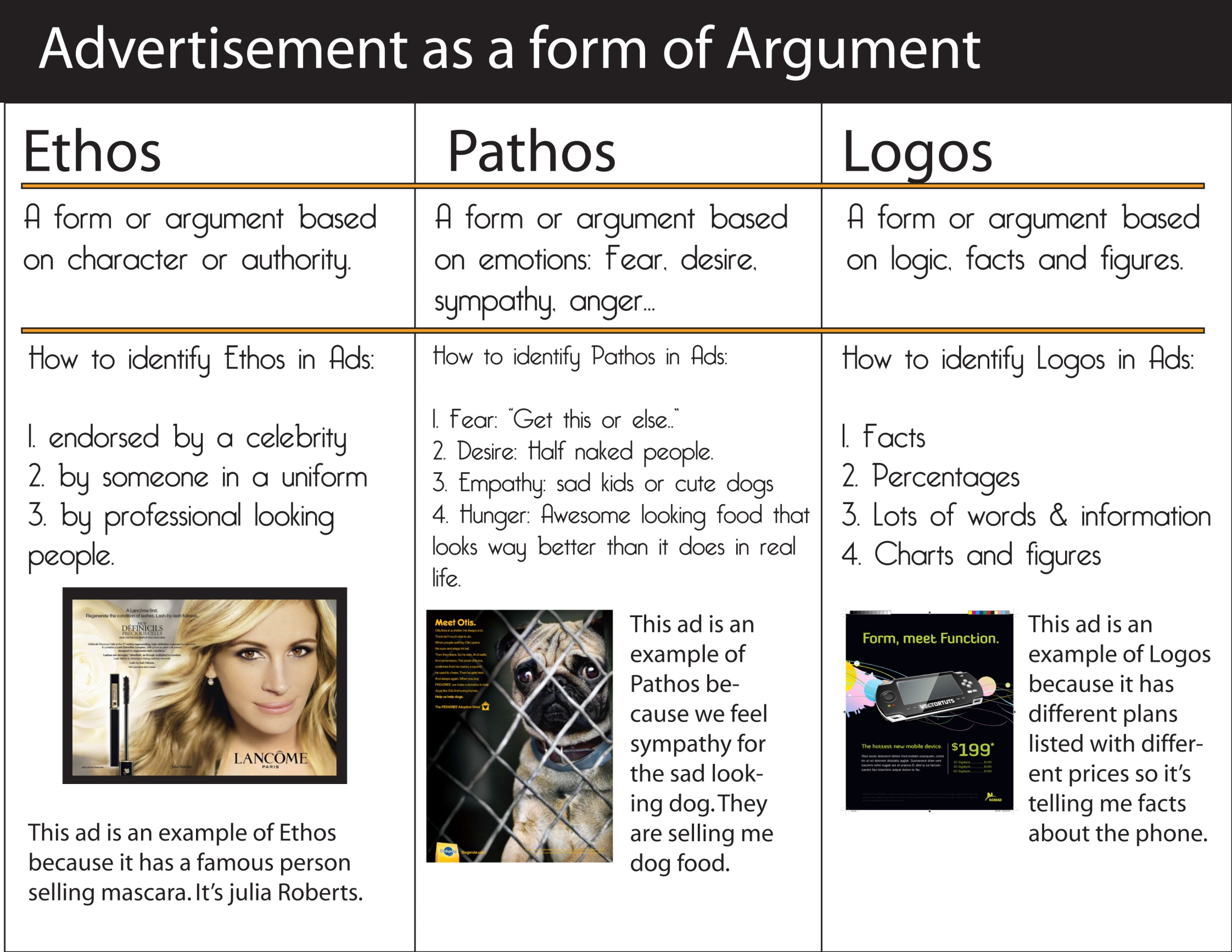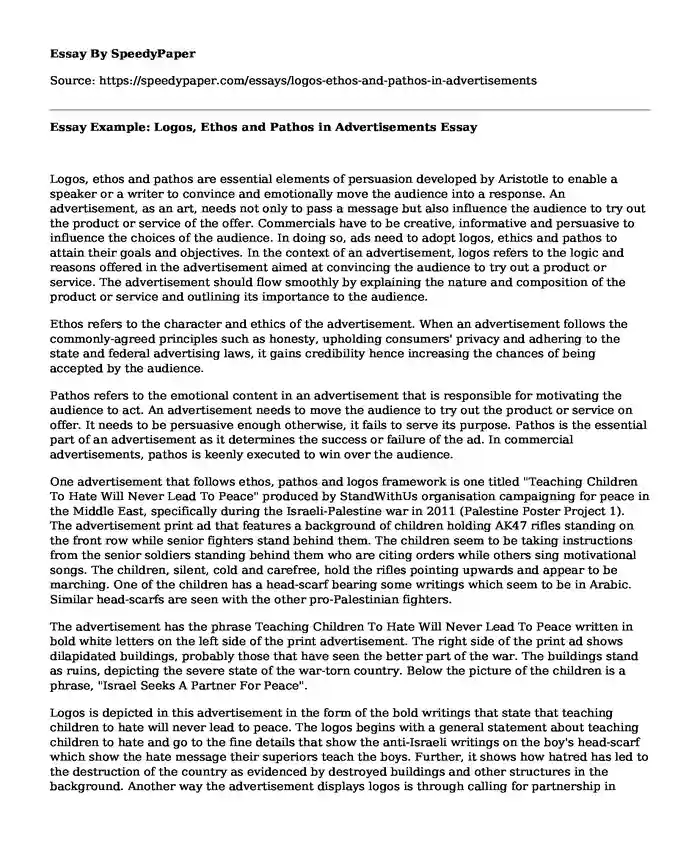Unlocking The Power Of Ethos In Modern Advertising
In the fast-paced digital era, leveraging ethos in advertisements has become a pivotal strategy for marketing success. Rooted in Aristotle's rhetorical theory, ethos centers on building credibility and trust between brands and their audiences. By integrating ethos into their marketing efforts, businesses can forge deep connections with consumers, leading to increased engagement and conversions. This article delves into the significance of ethos in contemporary marketing and offers actionable insights to help you craft persuasive and impactful campaigns.
As consumer skepticism toward traditional advertising grows, marketers must adapt by embedding ethos into their strategies. Ethos-driven advertisements not only enhance brand trust but also cultivate enduring relationships with audiences. In this comprehensive guide, we will explore the principles of ethos and its application across various advertising formats, ensuring your campaigns resonate with authenticity.
This article will also provide valuable tips, illustrative examples, and expert insights to help you master the art of ethos-based advertising. By the conclusion of this guide, you will possess a robust understanding of how to harness ethos to design compelling marketing campaigns that connect with your target audience and drive business success.
- Discover Luxury And Comfort At Best Western Plus Island Palms And Marina San Diego
- Exploring The Timeless Legacy Of Bruce Springsteen
Table of Contents
- Exploring Ethos: The Backbone of Trustworthy Advertising
- The Significance of Ethos in Contemporary Marketing
- Defining the Hallmarks of Ethos-Driven Advertisements
- Strategies for Building Ethos in Your Advertising Campaigns
- Case Studies: Exemplary Ethos-Driven Advertisements
- Assessing the Impact of Ethos in Advertising
- Ethos, Logos, and Pathos: A Comparative Examination
- Navigating Challenges and Best Practices in Ethos-Based Advertising
- Ethos in Digital Advertising: Emerging Trends and Opportunities
- The Evolution of Ethos in Marketing
Exploring Ethos: The Backbone of Trustworthy Advertising
Ethos is a rhetorical technique that appeals to an audience's sense of trust and credibility. In the context of advertising, ethos involves utilizing authoritative voices, expert insights, and authentic narratives to establish trust with consumers. This approach is especially potent in today’s digital landscape, where consumers are bombarded with marketing messages and seek brands that embody authenticity and integrity.
Historical Foundations of Ethos in Rhetoric
The concept of ethos traces back to ancient Greece, where Aristotle identified it as one of the three modes of persuasion, alongside logos (logical appeal) and pathos (emotional appeal). Ethos focuses on the character and credibility of the speaker, making it a cornerstone of effective communication. By cultivating a robust ethos, advertisers can project authority and trustworthiness, creating a lasting impression on their audience.
Why Ethos is Essential in Advertising
In an age of information saturation, consumers are more discerning than ever when it comes to advertising. They seek brands that align with their values and demonstrate authenticity. Ethos-driven advertisements fulfill these expectations by delivering credible, trustworthy messages that foster enduring relationships between brands and consumers.
- Understanding The Role And Importance Of The Us Bureau Of The Census
- Discover The Exceptional Experience At Brookfield East High School
The Significance of Ethos in Contemporary Marketing
Modern marketing has transformed dramatically, with digital channels and social media platforms profoundly influencing consumer behavior. In this dynamic landscape, ethos-driven advertisements serve as a powerful tool for brands to distinguish themselves from competitors and forge meaningful connections with their audience.
Strengthening Brand Trust Through Ethos
Trust is a cornerstone of consumer decision-making. By embedding ethos into their advertising strategies, brands can showcase their expertise, reliability, and commitment to quality. This approach not only enhances brand reputation but also nurtures customer loyalty and advocacy.
Amplifying Consumer Engagement with Ethos
Ethos-driven advertisements encourage consumers to interact with brands on a deeper level. By incorporating expert testimonials, authentic storytelling, and transparent communication, marketers can develop campaigns that resonate with their audience and drive meaningful engagement.
Defining the Hallmarks of Ethos-Driven Advertisements
Successful advertisements with ethos share several defining characteristics that contribute to their effectiveness. These include:
- Utilization of authoritative voices and expert opinions
- Incorporation of genuine storytelling and real-life anecdotes
- Presentation of credible data and statistics
- Emphasis on brand values and mission
- Consistency in messaging and tone
By focusing on these elements, marketers can craft advertisements that not only establish credibility but also deeply connect with their target audience.
Strategies for Building Ethos in Your Advertising Campaigns
To create advertisements with ethos, marketers should concentrate on several key strategies:
Capitalizing on Expert Testimonials
Incorporating expert opinions and endorsements into your advertising campaigns can significantly enhance your brand's credibility. For instance, collaborating with industry leaders or influencers can position your brand as a trusted authority in its field.
Employing Authentic Storytelling
Stories possess the power to forge emotional connections with audiences. By sharing genuine, relatable stories that reflect your brand's values and mission, you can create advertisements that resonate with consumers and build lasting relationships.
Case Studies: Exemplary Ethos-Driven Advertisements
Several brands have successfully implemented ethos-driven advertising strategies, achieving remarkable outcomes. For example:
- Patagonia: Renowned for its dedication to environmental sustainability, Patagonia's advertisements often feature expert testimonials and real-life narratives that underscore the brand's values and mission.
- Apple: Apple's marketing campaigns frequently emphasize the company's innovative spirit and commitment to quality, establishing a compelling ethos that resonates with its audience.
- Google: By presenting expert insights and credible data in its advertisements, Google has cultivated a reputation as a trusted authority in the technology sector.
Assessing the Impact of Ethos in Advertising
To gauge the effectiveness of ethos-driven advertisements, marketers should focus on several key metrics:
- Brand trust and reputation
- Customer engagement and loyalty
- Social media interactions and shares
- Conversion rates and sales performance
By monitoring these indicators, businesses can evaluate the influence of ethos on their advertising campaigns and make informed decisions to refine their strategies.
Ethos, Logos, and Pathos: A Comparative Examination
While ethos emphasizes credibility and trust, logos centers on logical reasoning, and pathos appeals to emotions. Each mode of persuasion possesses its own strengths and limitations, and the most effective advertising campaigns often integrate elements of all three. For example:
- Ethos: Establishes authority and trust through expert opinions and credible data
- Logos: Provides logical arguments and evidence to support claims
- Pathos: Connects with audiences on an emotional level through storytelling and imagery
Navigating Challenges and Best Practices in Ethos-Based Advertising
Developing advertisements with ethos presents several challenges, including:
- Establishing credibility in a competitive marketplace
- Maintaining consistency in messaging and tone
- Adapting to evolving consumer preferences and trends
To overcome these hurdles, marketers should adhere to best practices such as:
- Conducting thorough research to identify credible sources and data
- Partnering with industry experts and influencers to enhance authority
- Regularly evaluating and refining advertising strategies based on performance metrics
Ethos in Digital Advertising: Emerging Trends and Opportunities
As digital advertising continues to evolve, ethos-driven campaigns present numerous opportunities for brands to engage with their audience. Emerging trends such as:
- Influencer marketing
- User-generated content
- Transparent brand communication
offer exciting possibilities for advertisers to leverage ethos and create impactful campaigns that resonate with consumers.
The Evolution of Ethos in Marketing
As consumer expectations continue to shift, the importance of ethos in advertising will only increase. Brands that prioritize credibility, authenticity, and trust will be best positioned to thrive in the ever-changing marketing landscape. By embracing ethos-driven strategies and staying attuned to emerging trends, marketers can create advertisements that not only drive business results but also foster meaningful connections with their audience.
Conclusion
In summary, advertisements with ethos play a critical role in modern marketing by establishing credibility, building trust, and nurturing long-term relationships with consumers. By integrating expert testimonials, authentic storytelling, and credible data into their campaigns, marketers can create persuasive advertisements that resonate with their audience and propel business success.
We encourage you to share your thoughts and experiences with ethos-driven advertising in the comments section below. Additionally, feel free to explore our other articles for further insights into effective marketing strategies. Together, let's continue to elevate the art of advertising and create meaningful connections with consumers globally.


Detail Author:
- Name : Bridget Abshire
- Username : jorge.farrell
- Email : johnson.eulah@hotmail.com
- Birthdate : 1986-12-06
- Address : 811 Osinski Roads Lake Sebastianville, CO 64581
- Phone : +1-802-704-4654
- Company : Wisozk, Toy and Osinski
- Job : Medical Appliance Technician
- Bio : Eum eos rerum iusto ut ducimus rerum. Rerum vel et ratione. Sit consequatur aperiam quis perspiciatis iure.
Socials
linkedin:
- url : https://linkedin.com/in/ruby.smith
- username : ruby.smith
- bio : Non quidem itaque iusto consequatur.
- followers : 5957
- following : 350
tiktok:
- url : https://tiktok.com/@ruby8144
- username : ruby8144
- bio : Nesciunt iure et minima ut et vel. Voluptatem cum et facilis.
- followers : 5374
- following : 1856